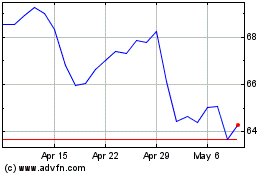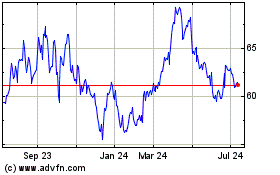Sports, Retailers, Airlines, Autos: the Damage Across Business
March 14 2020 - 9:05AM
Dow Jones News
By Thomas Gryta and Jennifer Maloney
The rapidly spreading coronavirus has reached every corner of
the U.S. economy, upending the jobs of Seattle taxi drivers, Texas
oil workers and Wall Street traders -- and nearly everyone in
between.
The virulent invader, which swept through Asia and Europe, is
leading many U.S. businesses to hoard cash, pare spending and
rethink how they operate without knowing how long the troubles will
last. Some that lost business may never get that revenue back.
Thinner profit margins and a focus on cost cutting mean some firms
may lose key workers, vendors and the ability to invest for the
future.
The pain is acute at companies with high levels of debt or that
were struggling before the outbreak. Already, shale oil driller
Occidental Petroleum Corp., laden with debt from its $38 billion
purchase last year of a rival, has slashed its dividend and
spending plans. Boeing Co., wounded by the grounding of its 737 MAX
jet, has frozen its hiring and maxed out its credit lines.
"If this lasts a few months, we will start seeing retail
casualties pile up," said Jerry Storch, the former chief executive
of Toys "R" Us Inc. and Hudson's Bay Co.
The respiratory illness, which first paralyzed many of China's
factories, has now frozen businesses across industries. Airlines
have cancelled thousands of flights. Apple Inc. and Patagonia are
closing their retail stores for two weeks. Americans are now
expected to buy 1.5 million fewer cars this year, one analyst
predicted. Major sports leagues have suspended play indefinitely,
dealing a blow to venues and broadcasters.
"I'm tossing and turning at night about it," said Aron Ain,
chief executive of Kronos Inc., a software maker with 6,000
employees. "I'm uncomfortable because I haven't been through it
before."
The spread of the virus has led to a nearly endless stream of
hard-to-answer questions from Kronos staff, like whether or not to
travel to client meetings. Some clients are starting to put off
purchasing decisions, Mr. Ain said, adding that, a week from now,
it could be more.
There have been few mass layoffs so far in the U.S., which
before the outbreak had the lowest levels of unemployment in
decades. During the 2008 financial crisis, nearly six in 10
companies stopped hiring or decreased staffing, while 35% froze
pay, according to executive search firm Korn Ferry.
"Cutting muscle and hurting your ability to recover is far more
damaging to an organization than limping along with a couple of
quarters of extra expense," said Bob Wesselkamper, a vice chairman
at Korn Ferry.
Declared a global pandemic on Wednesday, the new coronavirus had
infected more than 125,000 people in more than 100 countries. More
than a third of the infections globally have been outside China.
They include a Fiat Chrysler Automobiles NV worker at an Indiana
plant and the CEO of British telecom giant BT Group PLC.
Inside China, the rate of infection has slowed after the
government locked down much of the country for more than a month.
Factories are restarting production and workers are returning to
their jobs. Apple reopened all 42 of its stores in China on Friday
even as it shut them in the rest of the world.
Businesses are adapting to the rapidly changing public-health
guidance, sending workers home, canceling events and switching to
teleconferencing. BT said its chief executive, 53-year-old Philip
Jansen, has self-isolated and will work remotely. It will
deep-clean its London headquarters. Fiat Chrysler said it would
quarantine some workers from the Indiana factory but the
transmission plant would continue normal operations.
U.S. consumer spending was strong before the virus surfaced, and
not all business activity has stalled. PepsiCo Inc. struck a nearly
$4 billion deal this week to acquire the maker of Rockstar energy
drinks. Insurance broker Aon PLC agreed to buy a rival for nearly
$30 billion, the biggest deal of the year on one of the wildest
days for markets.
Just as households are stocking up on supplies and preparing for
an uncertain future, companies are making similar moves by making
sure they have credit lined up and cash they may need, said Gregory
Daco, chief U.S. economist at Oxford Economics. "The shock has
morphed in the last couple of weeks," he said.
Here is a look at how the virus is rippling through every corner
of the economy:
Energy
Airlines
Consumer products
Sports
Movies
Hotels
Pharmaceuticals
Grocers
Gambling
Luxury goods
Rideshare/Food delivery
Retailers
Education
Health insurers
Manufacturers
Concerts
Autos
(END) Dow Jones Newswires
March 14, 2020 08:50 ET (12:50 GMT)
Copyright (c) 2020 Dow Jones & Company, Inc.
Occidental Petroleum (NYSE:OXY)
Historical Stock Chart
From Mar 2024 to Apr 2024

Occidental Petroleum (NYSE:OXY)
Historical Stock Chart
From Apr 2023 to Apr 2024
